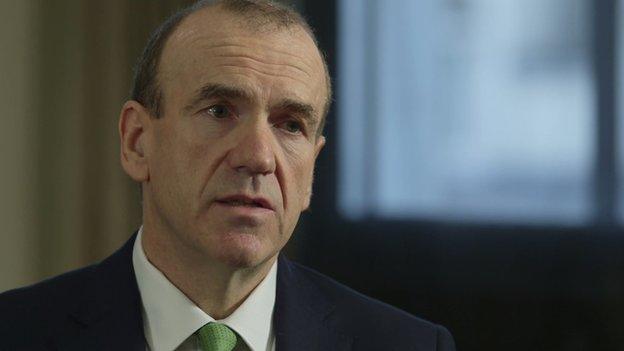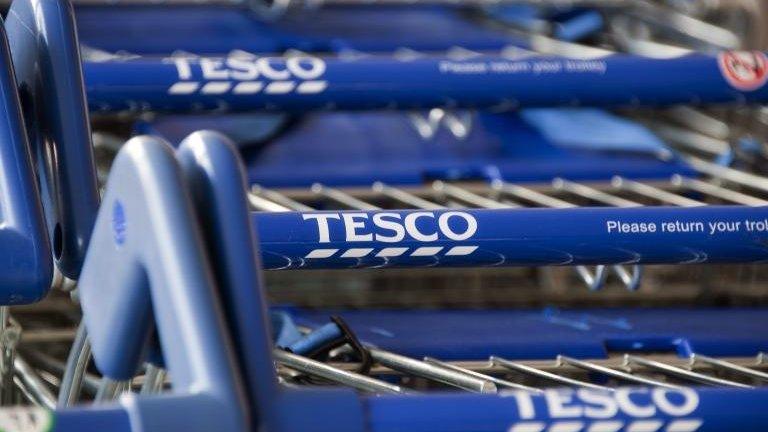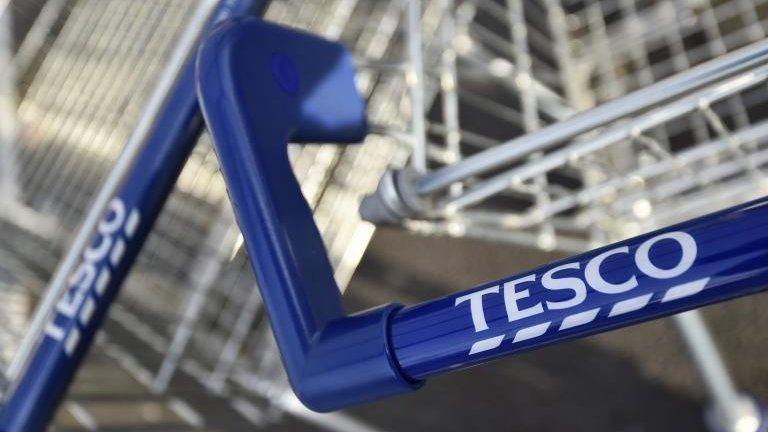Sir Terry Leahy: Tesco 'eroded customers' trust'
- Published
Sir Terry Leahy: Tesco 'saw a failure in leadership'
Tesco allowed the trust of its millions of customers to be "eroded", Sir Terry Leahy has said in his first detailed comments on the crisis at the retailer.
The former chief executive said it had lost its reputation for low prices.
Sir Terry told BBC Panorama there was a "failure" of leadership under his successor, Philip Clarke.
The programme also found that cosmetics giant L'Oreal threatened legal action over a disputed payment of about £1m demanded by Tesco.
Sir Terry was the man widely credited with building Tesco into one of the world's largest and most successful retailers, presiding over 14 years of growth in profits and sales.
'Shopped around'
He said losing the reputation for low prices was very damaging for Tesco - Asda is now 6% cheaper.
"Tesco is the biggest, people expect it to have the best prices and know they can trust Tesco to deliver that and not have to shop around and check that they're getting the best deal.
"I think that some of that trust has been eroded, which has meant that people have shopped around."
On the failure of Tesco and the departure of Mr Clarke, Sir Terry said: "People tried very hard to do the right thing, it clearly has not worked.
"In the end that's a failure of leadership, not a failure of the business, not a failure of the people who work hard every day in the business.
"When you're the CEO, if it goes well, you get credit, if it doesn't go well, you must take responsibility and Phil Clarke has taken that responsibility and paid the price with his job."
Tension
Some allege there was tension at the business as Mr Clarke attempted to reverse the decline in profits and sales.
A number of people who have left the organisation have told the BBC of shouting matches at senior levels as people argued over how to right the listing ship.
A number of senior figures did leave, leading to accusations that the management team was spread too thin and that the culture at the organisation changed.
"I think it lost too much talent," Sir Terry said.

Sir Terry said he thought Tesco's culture changed under Phillip Clarke 'and not for the better'
"It's a big company, Tesco, and also very empowered - people were given responsibility and trusted to get on with their job, so there was a big team of experienced leaders.
"And too many of those were allowed to go in too short a period of time and so there was a shortage of experience, the kind of experience you need to carefully navigate a business like Tesco through this very turbulent and difficult period of this long, long recession, with these changes in structure of retailing taking place.
"I think the culture did change under Phil Clarke and not for the better.
"I think if you talked to people who knew Tesco, worked in Tesco when I was there, actually the culture was pretty positive and it has to be because it employs half a million people and you can't make them do things, you have to motivate them to do things, they've got to want to do it."
In his first public statement since leaving the retailer abruptly in June last year, Mr Clarke said that he needed to change the business when he became chief executive in 2011 because of issues "that had been building for some time".
He said his new strategy for a "multi-channel" Tesco had the full backing of the board and was the right direction for the supermarket.
Legal action
Panorama has discovered that in 2013, as it chased commercial income, Tesco had a major falling out with L'Oreal, one of the world's biggest cosmetics firms, which has a market capitalisation that is actually larger than Tesco's.
L'Oreal disputed almost £1m worth of charges, fees and fines from Tesco over supplier agreements. It threatened legal action over the disputed amounts and said it would take its products off Tesco's shelves.
Tesco said: "L'Oreal is the largest cosmetics company in the world, with a turnover of €29bn, generating profits of €3.9bn in 2013.
"As such, it is a major supplier for Tesco in all our markets and we value our relationship with them. Differences do sometimes occur in the course of commercial relationships and we always aim to resolve them amicably, as we did in this case."
Panorama also found:
Former chief financial officer Laurie McIlwee sent an internal email in 2012 warning about financial controls at the retailer after a problem was discovered in its Polish business. The email told finance staff: "You should be in no doubt as to the seriousness [of] mis-declarations" and said that accounting for profits early was forbidden "where they cannot be justified". The early accounting of profits appears to be at the heart of the Serious Fraud Office investigation into Tesco's £263m mis-statement of its forecasted profits, which it revealed last autumn. In 2012, the finance department caught the issue before it was reported externally, but the behaviour still appears to have continued in other parts of the business.
The Groceries Code Adjudicator, charged with policing the relationship between retailers and suppliers, has yet to be given powers to fine supermarkets up to 1% of their UK revenue for supplier mistreatment, despite requesting the ability to do so more than a year ago. Vince Cable, the Business Secretary, said that he backed the fines and accused the Treasury of "sitting" on the issue. The government said: "We are unaware of any delay. We introduced this code and are working through details in the usual way."
Watch Panorama: Trouble at Tesco on BBC One on 19 January at 20.30 GMT or later on the BBC iPlayer.
- Published19 January 2015
- Published8 January 2015

- Published3 January 2015
- Published22 December 2014
